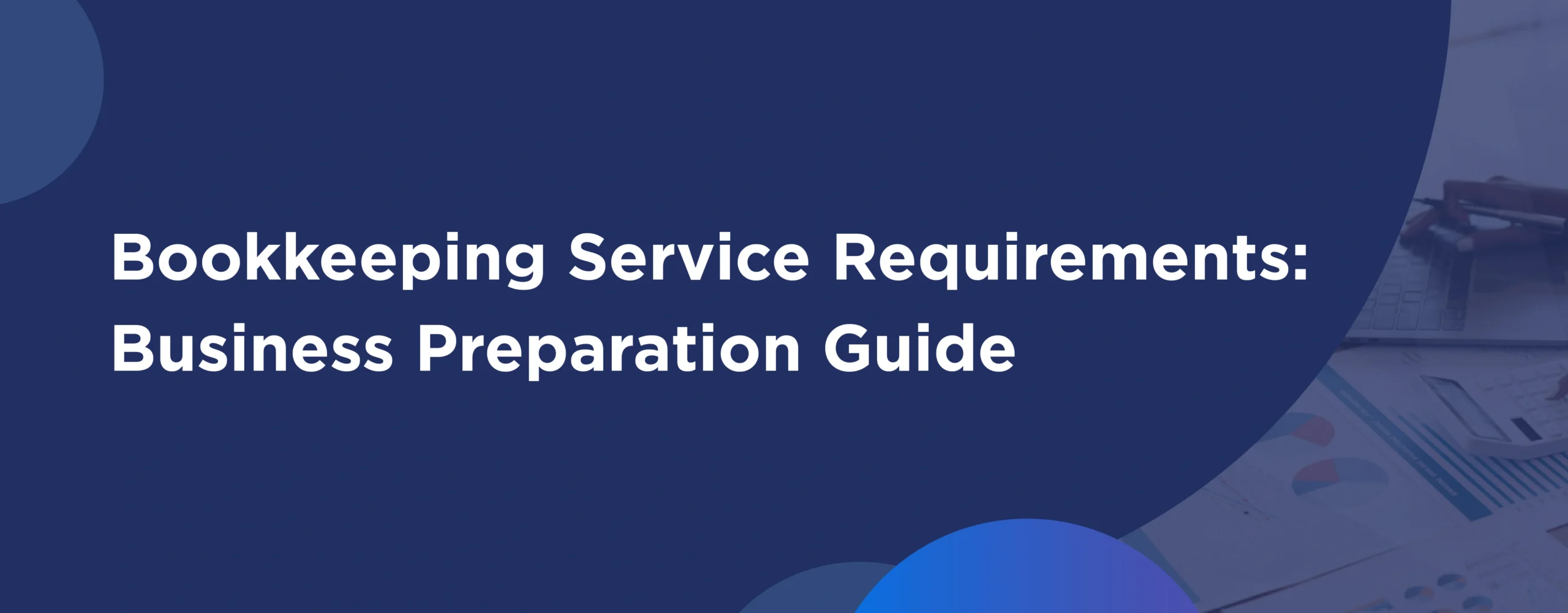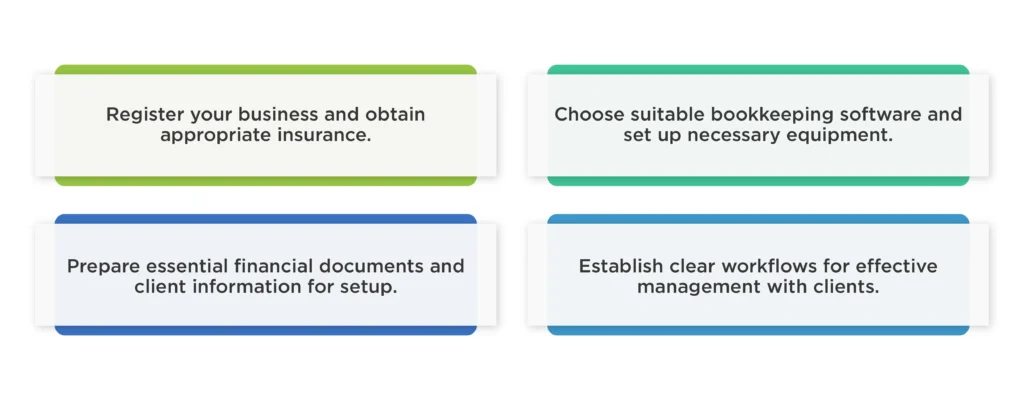
Bookkeeping requirements form the foundation of successful business financial management in Ireland. The Revenue Commissioners Office imposes taxes based on company size and turnover, making accurate record-keeping essential.
Every business needs proper financial record keeping systems in place. These requirements ensure accurate tax calculations and compliance with Revenue regulations.
The main benefit of outsourced bookkeeping and payroll service is to allow you to focus on your core business with the peace of mind that your books and records are in safe hands.
Essential Bookkeeping Requirements
Small business outsourced bookkeeping services encompass various critical functions. These services maintain accurate financial records and ensure regulatory compliance with Irish tax law.
Core services include transaction recording, bank reconciliation, and invoice management. Professional bookkeeping services also handle payroll processing and VAT returns preparation.
Monthly reconciliation of debtors and creditors represents a fundamental requirement for maintaining accurate business records.
Bookkeeper Requirements and Qualifications
Basic Educational Requirements
Most bookkeeping positions in Ireland require a Leaving Certificate with strong mathematics and English results. These qualifications demonstrate fundamental numerical and communication skills necessary for financial work.
Advanced qualifications include higher education in business studies, mathematics, or economics. These subjects provide deeper understanding of financial principles and Irish business operations.
A degree isn’t required for bookkeeping roles. The Career Academy Certificate In Bookkeeping could kickstart your career. Seize the opportunity to become a qualified Bookkeeper in just ten weeks!
Professional Qualifications
CPA Ireland is one of Ireland’s leading Accountancy Bodies and provides qualifications for those wishing to pursue an accountancy career. These qualifications provide credibility and career advancement opportunities.
The Career Academy IE offers flexible, online courses designed to help you gain industry-accredited and recognised qualifications from IAB, Sage, and Xero.
IBAT Dublin offers advanced diplomas in bookkeeping and payroll that equip students with necessary knowledge of HR policies in Ireland.
Legal Requirements
No specific licensing requirements exist for bookkeepers in Ireland. However, professional qualifications significantly enhance employment prospects and client confidence.
Accountants usually have a degree in accounting, finance, or a related field and must have professional certification, such as a Certified Public Accountant (CPA) or Chartered Accountant (CA).
Professional membership organisations provide credibility and ongoing development opportunities. These memberships demonstrate commitment to professional standards and continuous learning.

Bookkeeper Training for different business types
Startup Bookkeeping Requirements
Bookkeeping for startups requires understanding of initial capital recording, expense tracking, and cash flow management. Irish startups need simple yet comprehensive systems from day one.
Within 30 days of starting trade, it’s mandatory to register for Corporation Tax with the Irish Revenue Commissioners.
Early-stage companies benefit from part-time bookkeeper required arrangements. This approach provides professional expertise whilst managing costs effectively during growth phases.
Small Business Requirements
Irish limited liability companies must meet specific criteria including turnover not exceeding €8,800,000, balance sheet total not exceeding €4,400,000, and average employees not exceeding specific limits.
Small businesses need regular financial statement preparation including profit and loss accounts and balance sheets. These reports inform decision-making and satisfy Revenue requirements.
Many small businesses require assistance with VAT compliance and quarterly returns. Professional bookkeepers ensure accurate submissions to avoid penalties.
Part-Time vs Full-Time Requirements
Part time bookkeeper required positions suit smaller businesses with limited transaction volumes. These arrangements provide cost-effective professional bookkeeping services without full-time employment costs.
Full-time bookkeepers handle complex business requirements including multiple entities, detailed analysis, and strategic financial planning. Larger businesses typically require dedicated bookkeeping professionals.
The choice depends on transaction volume, business complexity, and available budget. Many businesses start with part-time arrangements and expand as they grow.
Types of Bookkeeping Services Available
Traditional In-House Bookkeeping
In-house bookkeepers work directly for individual businesses. They handle all financial record keeping, reporting, and compliance activities on-site or remotely.
This arrangement provides dedicated attention and deep business knowledge. In-house bookkeepers understand specific business processes and can provide tailored advice.
However, in-house positions require employment costs including salaries, benefits, and training expenses. Small businesses may find these costs prohibitive compared to outsourced bookkeeping alternatives.
Outsourcing Bookkeeping Services
Expert bookkeepers monitor your day-to-day transactions and help manage daily expenses through professional outsourced services.
Professional bookkeeping services offer scalable solutions for businesses of all sizes. These providers maintain current knowledge of Revenue regulations and best practices across multiple industries.
Outsourced bookkeepers typically serve multiple clients, bringing diverse experience and insights. This breadth of knowledge benefits individual businesses through proven methodologies and industry benchmarks.
Online Bookkeeping Services
Cloud-based outsourced bookkeeping services provide remote access to financial data and real-time collaboration capabilities. Modern Irish business bookkeeping services must use cloud platforms for secure data access.
Online services integrate with Irish banking systems, payment processors, and other business tools. This integration streamlines data entry and reduces manual processing errors.
Digital platforms offer automated features including bank reconciliation, invoice generation, and expense categorisation. These capabilities improve efficiency whilst maintaining accuracy standards.
Essential Bookkeeping Tasks and Responsibilities
Daily Bookkeeping Tasks
Daily bookkeeping responsibilities include transaction recording, invoice processing, and expense categorisation. These routine tasks maintain up-to-date financial records for decision-making purposes.
Bookkeepers process customer payments, supplier invoices, and bank transactions. Accurate daily processing prevents backlogs and ensures timely financial reporting.
Cash flow monitoring represents another critical daily responsibility. Bookkeepers track incoming and outgoing funds to maintain optimal working capital levels.
Monthly Requirements
Monthly bookkeeping tasks include bank reconciliations, financial statement preparation, and variance analysis. These activities provide comprehensive business performance insights.
VAT return preparation occurs monthly or quarterly depending on business registration status. Professional bookkeepers ensure accurate submissions to Revenue Commissioners.
Payroll processing typically occurs monthly, including salary calculations, tax deductions, and pension contributions. Accurate payroll processing ensures compliance with Irish employment regulations.
Annual Obligations
Annual requirements include year-end accounts preparation, tax return filing, and statutory reporting. These obligations satisfy legal requirements and provide comprehensive business performance analysis.
Companies Registration Office filings represent mandatory annual obligations for limited companies. Bookkeepers prepare accounts and annual returns for regulatory submission.
Annual tax planning involves reviewing business performance and identifying opportunities for tax optimisation. Professional bookkeepers provide valuable insights for future planning.
Bookkeeping Software and Technology Requirements
Popular Irish Bookkeeping Software
Leading software options include Sage, Xero, and QuickBooks. These platforms offer comprehensive features for businesses of all sizes and industries.
Industry-accredited qualifications from IAB, Sage, and Xero ensure bookkeepers can effectively use these platforms.
Software selection depends on business requirements, user expertise, and integration needs. Professional bookkeepers recommend platforms based on specific client circumstances and growth plans.
Technology Skills Required
Modern bookkeepers need proficiency with cloud-based accounting software and digital tools. These technical skills are essential for efficient service delivery and client satisfaction.
Data analysis capabilities help bookkeepers provide insights beyond basic record keeping. Excel proficiency remains valuable for custom reporting and analysis requirements.
Understanding of integration capabilities and automated workflows improves service efficiency. Bookkeepers who leverage technology can serve more clients whilst maintaining quality standards.
Security and Compliance Considerations
Data security represents a critical requirement for bookkeeping services. Professional bookkeepers implement robust security measures including encryption, secure access controls, and regular backups.
GDPR compliance affects how bookkeeping services handle client data. Proper procedures ensure personal and financial information receives appropriate protection and processing oversight.
Regular software updates and security monitoring prevent data breaches and system vulnerabilities. Professional bookkeeping services maintain current security protocols and incident response procedures.
Cost Considerations and Pricing Models
Hourly Rates vs Fixed Pricing
Bookkeeping service pricing varies based on experience, qualifications, and service scope. Hourly rates typically range from €20-60 per hour depending on complexity and expertise levels.
Fixed monthly pricing provides predictable costs for businesses and steady income for bookkeepers. This model suits businesses with consistent transaction volumes and requirements.
Project-based pricing applies to specific tasks like year-end accounts or system implementations. This approach provides clear cost expectations for defined deliverables.
Factors Affecting Costs
Transaction volume significantly impacts bookkeeping costs. Businesses with higher transaction volumes require more time and attention from bookkeeping professionals.
Industry complexity affects pricing due to specialised knowledge requirements. Regulated industries or unique business models may command premium rates.
Urgency and deadlines influence pricing for bookkeeping services. Rush jobs or tight deadlines typically incur additional charges for priority handling.
Budget Planning for Bookkeeping Services
Small businesses should budget 2-5% of revenue for bookkeeping services. This percentage varies based on business complexity and service requirements.
Startup businesses may require higher initial investment for system setup and process establishment. These upfront costs decrease as systems mature and processes stabilise.
Annual budgeting should include potential service expansion as businesses grow. Planning for increased requirements prevents budget surprises during growth phases.
Quality Standards and Professional Development
Professional Memberships
Professional memberships with CPA Ireland, IAB, or other recognised bodies demonstrate commitment to ongoing development and ethical standards. These affiliations provide credibility and access to continuing education resources.
Membership requirements include ongoing professional development and adherence to ethical codes. These standards protect both bookkeepers and their clients through established best practices.
Professional indemnity insurance often requires professional membership or equivalent qualifications. This insurance protects against errors and omissions claims from clients.
Continuing Education Requirements
The bookkeeping profession requires ongoing learning to maintain current knowledge of Revenue regulations and best practices. Professional bodies mandate continuing professional development for members.
Regular training covers regulatory changes, software updates, and industry developments. Staying current ensures bookkeepers provide accurate and compliant services to clients.
Specialisation training in areas like construction accounting or charity bookkeeping can command premium rates. Niche expertise provides competitive advantages in specific market segments.
Quality Assurance Measures
Regular quality reviews ensure bookkeeping services maintain accuracy and compliance standards. These reviews identify potential issues before they become significant problems.
Client feedback mechanisms help improve service delivery and identify areas for development. Regular communication ensures client expectations align with service delivery.
Document retention and backup procedures protect client data and ensure regulatory compliance. Proper systems prevent data loss and support audit requirements when necessary.
Full-Time vs Part-Time vs Outsourced Bookkeeping
| Feature | Full-Time In-House | Part-Time In-House | Outsourced Services |
|---|---|---|---|
| Cost Structure | High (€30,000-€50,000+) | Medium (€12,000-€25,000) | Variable (€250-€2,500/month) |
| Expertise Level | Dedicated to business | Limited hours available | Broad industry experience |
| Availability | Full-time availability | Limited schedule | Flexible arrangements |
| Revenue Knowledge | Business-specific focus | General knowledge | Specialist expertise |
| Technology Access | Company-provided | Company-provided | Latest professional tools |
| Scalability | Limited by individual | Restricted hours | Easily scalable |
| Risk Management | Employee protections | Shared responsibility | Professional indemnity |
| Best For | Large businesses | Medium businesses | Small to medium businesses |
Assessing Business Requirements
Evaluate transaction volume, complexity, and regulatory requirements to determine appropriate bookkeeping solutions. Simple businesses may need basic services whilst complex operations require comprehensive support.
Consider growth plans when selecting bookkeeping arrangements. Solutions should accommodate business expansion without requiring complete system changes.
Industry-specific requirements may favour certain approaches. Regulated industries often benefit from specialist bookkeeping services with relevant experience.
Selection Criteria
Professional qualifications provide assurance of competency and ethical standards. Look for CPA Ireland, IAB, or equivalent qualifications when selecting bookkeeping services.
Technology proficiency ensures efficient service delivery and modern reporting capabilities. Bookkeepers should demonstrate familiarity with current software and digital tools.
Communication skills are essential for effective client relationships. Regular reporting and responsive communication improve business decision-making and satisfaction.
Implementation Planning
Proper onboarding ensures smooth transition to new outsourced bookkeeping arrangements. This includes system setup, historical data transfer, and process establishment.
Training and handover procedures help existing staff understand new outsourcing bookkeeping systems and responsibilities. Clear communication prevents confusion during transition periods.
Regular review meetings ensure ongoing service quality and address any emerging issues. Proactive communication maintains strong working relationships and outsourced bookkeeping service effectiveness.
Commonly Asked Questions about Bookkeeping Requirements
What are the basic requirements for hiring a bookkeeper for small business?
How to find qualified bookkeepers for your business needs?
What qualifications do you need for a small business bookkeeper?
Part-time bookkeeper vs full-time: Which is better for small businesses?
What are the tax-related bookkeeping services required for small business?
Best bookkeeping services for small businesses on a budget?
How to choose the right bookkeeper for your small business accounting needs?
Essential bookkeeping tasks for startups and small businesses?
Top bookkeeping services required for managing small business finances?
Parul is a content specialist with expertise in accounting and bookkeeping. Her writing covers a wide range of accounting topics such as payroll, financial reporting and more. Her content is well-researched and she has a strong understanding of accounting terms and industry-specific terminologies. As a subject matter expert, she simplifies complex concepts into clear, practical insights, helping businesses with accurate tips and solutions to make informed decisions.











